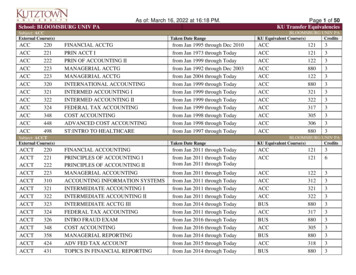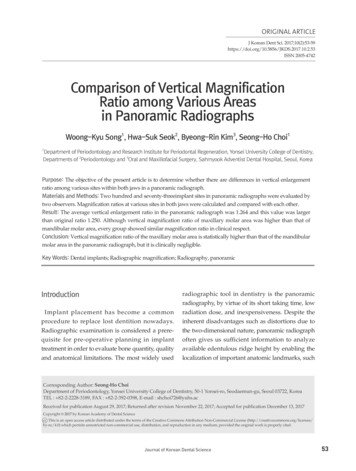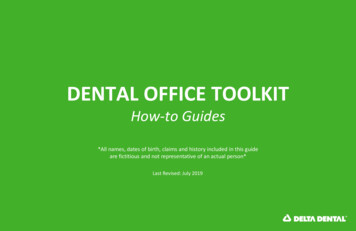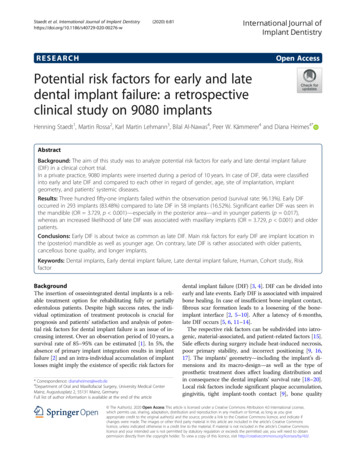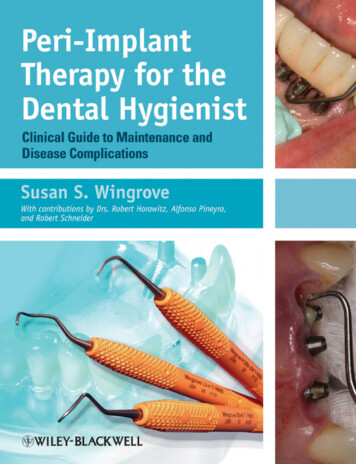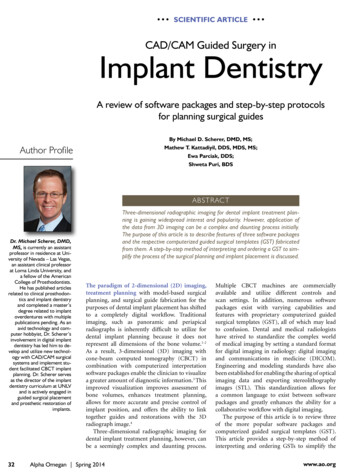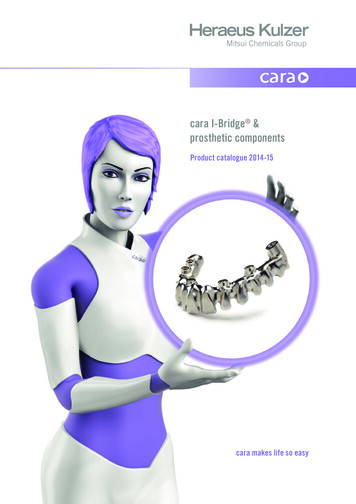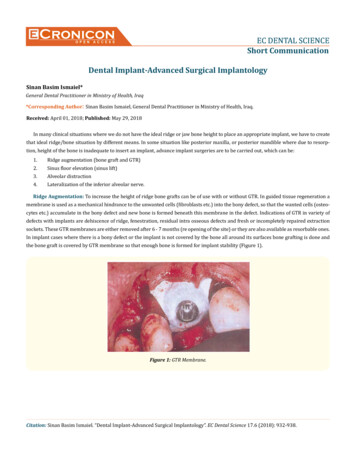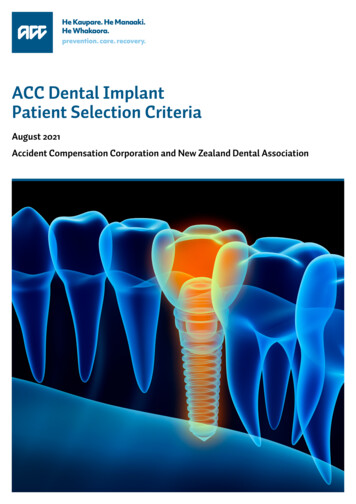
Transcription
ACC Dental ImplantPatient Selection CriteriaAugust 2021Accident Compensation Corporation and New Zealand Dental Association
ContentsIntroduction . . . . . . . . . . . . . . . . . . . . . . . . . . . . . . . . . . . . . . . . . . . . . . . . . . . . . . . . . . . . . . 2Scope . . . . . . . . . . . . . . . . . . . . . . . . . . . . . . . . . . . . . . . . . . . . . . . . . . . . . . . . . . . . . . . . 2Working in partnership . . . . . . . . . . . . . . . . . . . . . . . . . . . . . . . . . . . . . . . . . . . . . . . . . . . . . . 21. Our governing legislation, regulations, and your responsibilities . . . . . . . . . . . . . . . . . . . . . . . . 22. Standards set by professional bodies . . . . . . . . . . . . . . . . . . . . . . . . . . . . . . . . . . . . . . . . . 23. Major health sector frameworks, such as the Health PractitionersCompetence Assurance Act 2003 (HPCA Act) . . . . . . . . . . . . . . . . . . . . . . . . . . . . . . . . . . . . 2Ensuring necessary and appropriate treatment . . . . . . . . . . . . . . . . . . . . . . . . . . . . . . . . . . . . . . . . . 3How the guidance was developed . . . . . . . . . . . . . . . . . . . . . . . . . . . . . . . . . . . . . . . . . . . . . . . . . 4Dental implant patient selection criteria . . . . . . . . . . . . . . . . . . . . . . . . . . . . . . . . . . . . . . . . . . . . . 51. Age and general health . . . . . . . . . . . . . . . . . . . . . . . . . . . . . . . . . . . . . . . . . . . . . . . . . . . 52. Medical conditions . . . . . . . . . . . . . . . . . . . . . . . . . . . . . . . . . . . . . . . . . . . . . . . . . . . . . . 53. Dental health and history . . . . . . . . . . . . . . . . . . . . . . . . . . . . . . . . . . . . . . . . . . . . . . . . . . 74. Five-year auditable history . . . . . . . . . . . . . . . . . . . . . . . . . . . . . . . . . . . . . . . . . . . . . . . . . 85. Stable dentition . . . . . . . . . . . . . . . . . . . . . . . . . . . . . . . . . . . . . . . . . . . . . . . . . . . . . . . . 91
IntroductionWelcome to this guidance for dental implants forAccident Compensation Corporation (ACC) clients.The guidance sets out the criteria that must bemet for ACC to consider contributing towards thecost of dental implants. It is also an evidenceand consensus-based tool to help you to work inpartnership with us to make fair and consistentdecisions on necessary and appropriate treatment.ACC developed this guidance in partnershipwith representatives of the New Zealand DentalAssociation.ScopeThe scope is our agreed criteria when ACC isconsidering funding for dental implant therapy. Notethat the process of restoration with dental implantsinvolves two stages, the process to place the implantfixture and the restoration process (structuresattached to the dental implant). This guidance1. Our governing legislation,regulations, and your responsibilitiesThe AC Act sets out what we’re able to cover andrequires us to meet specific quality standards inhelping our covered injured clients. The ‘HealthProviders’ section on our website (www.acc.co.nz)has more information for you about what we cover,your responsibilities, and our position statements.It also explains how we support quality and work toresolve issues.2. Standards set by professional bodiesACC’s legislation requires dental providers to beregistered with their regulatory authorities and to holdcurrent annual practising certificates. We also expectyou to comply with the professional and practicestandards set down by the New Zealand Dental CouncilStandards Framework for Oral Health Practitioners.refers only to the patient selection criteria for dentalimplants.Working in partnershipACC is a Crown entity that delivers New Zealand’saccident insurance scheme as set out in the AccidentCompensation Act 2001 (AC Act). We all have a role toplay in ensuring the continued sustainability of thisunique scheme and this is why our partnership withyou is so important. Together, and in conjunctionwith other health professionals, we can help toensure that people injured in accidents in NewZealand receive the treatment they need to get backto everyday life.When you ask ACC for help in treating your patients,we’re guided by three key elements.23. Major health sector frameworks,such as the Health PractitionersCompetence Assurance Act 2003(HPCA Act)The HPCA Act protects the public’s health and safetyby providing mechanisms to ensure that healthpractitioners are competent and fit to practise theirprofession for the duration of their professionallives. Having one legislative framework enablesconsistent procedures and terminology across themany professions now regulated by the Act. TheHPCA Act is administered by the Ministry of Health- for more information, see the HPCA Act or theMinistry of Health commentary on the Act.
Ensuring necessary and appropriate treatmentBefore ACC can consider a dental implant request,When deciding if we can approve a client’s treatment,your client must have an accepted claim for theACC must take into account the:specific tooth/teeth that is to be treated, and theprimary need for the dental implant must be due tothe covered injury and not the pre-existing conditionof the tooth/teeth. There are other factors that wetake into account before approving entitlement/ nature and severity of the injury generally accepted means of treatment for suchan injury in New Zealand treatment of such an injurycontribution to treatment costs to rehabilitate, andyour clients should be told this. These other factorsother options available in New Zealand for the cost in New Zealand of the generally acceptedrelate to ensuring our clients will receive necessarymeans of treatment and the other options,and appropriate treatment as defined by the AC Act.compared with the benefit that the client is likelyYou have an essential role in helping your clients tonavigate their recovery from dental injury. The AC Actstates ACC is liable to contribute towards treatmentif it is for the purpose of restoring the client’shealth to the maximum extent practicable, and thetreatment: is necessary and appropriate has been or will be performed only on the numberto receive from the treatment.Essentially, we ask you to provide necessary andappropriate treatment that’s proportional to eachclient’s dental injury and expected recovery. If youbelieve a dental implant will achieve this outcome,you will find evidence-based and expert consensuson best-practice dental implant patient selectioncriteria in this guidance.of occasions necessary has been or will be given at an appropriate timeor place is of a type normally provided by the treatmentprovider is provided by a treatment provider of a typewho’s qualified to provide that treatment andwho normally provides that treatment: registeredperiodontists, maxillofacial surgeons, and oralsurgeons is provided after ACC agrees to the treatment.ACCIDENT COMPENSATION CORPORATION3
How the guidance was developedThe first version was developed and published in 2006 and the second in 2010.1 ACC and NZ Dental Association(NZDA) representatives collaborated to produce this version that provides practical guidance on patientselection criteria for dental implant treatment.ACC’s Dental Advisor, Rosemary Kennedy, requested that the 2010 guideline be updated. We convened an expertadvisory group (EAG) of NZDA specialists. Alongside evidence-based research2, updated since 2010, the EAGprovided expert consensus knowledge in this area. The current guidance considers the evidence, expert advice,and the ACC claims management processes. This 2021 version of the guidance will help you to make fair andconsistent decisions on necessary and appropriate treatment for ACC-covered dental injury clients.ACKNOWLEDGEMENTS – EXPERT ADVISORY GROUPRosemary KennedyACC Principal Clinical Advisor, Dental, Clinical ServicesSuzanne HanlinSenior Lecturer/Specialist Prosthodontist, Department of Oral Rehabilitation,Otago UniversityJim TalbotGeneral Practitioner, DentistryRohana De SilvaAssociate Professor, Department of Oral Diagnostic and Surgical Sciences, Otago University, Oraland Maxillofacial SurgeonGerry ThyneOral & Maxillofacial SurgeonMike SmithPeriodontistPaula LangeACC Clinical Quality and Governance Co-ordinator (EAG Support)Meagan StephensonSenior Research Advisor, ACC Strategy, Policy & ResearchKyla GibbonsTreatment and Support Assessor, ACC Operations Treatment & SupportKaryn DrummondTreatment and Support Assessor, ACC Operations Treatment & SupportMary AhernSenior Legal Advisor, ACC Legal Services (EAG Advisor)Patricia NilandPhD, Project Manager, ACC Clinical Quality and Governance TeamACKNOWLEDGEMENTS – EXPERTSJonathan BroadbentAssociate Professor, Dental Public Health, Department of Oral Sciences, Otago UniversityWarwick DuncanProfessor, Periodontics and Dental Implantology, Department of Oral Sciences, Otago UniversityJonathan LeichterAssociate Professor, Department of Oral Sciences, Otago UniversityMichael AustenACC Clinical Advice Manager; MBChB, LLB, DIH, DipComEmMed, FRNZCUC, FAFOEM (RACP-NZ)1.ACC Dental Implant Guidelines (2010). NZ: Accident Compensation Corporation. Retrieved from cc2458dental-implant-criteria.pdf; Larking, P (2004). Dental Implants: Patient Selection, Patient Satisfaction and Cost Factors: Evidence-based Review. NZ: AccidentCompensation Corporation; Ayson, M, Leichter, J and Lyons, K (2009). Dental Implants: Patient Selection Factors: Evidence-based Review. NZ: AccidentCompensation Corporation.2.Restorative Dentistry-UK (2019). Guidance on the Standards of Care for NHS-funded Dental Implant Treatment 2019. UK: The Royal College of Surgeons of England,Faculty of Dental Surgery.4
Dental implant patient selection criteriaThis guidance aims to mitigate the risk of implant failure and ensure appropriate patient selection, and to ensurefunctional, maintainable and predictable restorations for ACC clients to meet the requirements of the AC Act.1. Age and general healthYour patient must be at least 21 years old and dentally mature. There is no objective diagnostic tool to confirmthat a person’s craniofacial growth is complete, and evidence-based literature supports this age criterion.3The scientific literature confirms that some medical conditions and medications may increase the risk for thepatient undergoing surgery and may lead to premature failure (loss) of the implants.It is the surgical provider’s responsibility to screen for any and all conditions that may affect theosseointegration of the dental implant, longevity of the implant and health of the patient after receiving dentalimplants. The patient should be fit and healthy to undergo surgical and restorative dentistry treatment overa protracted period, which may last up to 12 months. ACC can contribute towards annual follow up visits as arequirement for the lifetime of the implant. They should also have the capacity to understand the proposedtreatment option, give informed consent, and comply with a protracted and complex treatment plan, dailydental homecare and regular dental attendances.2. Medical conditionsThere are some medical conditions that may indicate a patient is not an appropriate candidate for dentalimplant treatment. These medical conditions are outlined below. If your client has any of these conditions,medical approval from your client’s treating physician must be provided with the implant prior approval request.MEDICAL CONDITIONRATIONALEPatients who were treated with radiationtherapy for the oro-facial region.Patients who have received a more than ( 50 Gy) radiation therapy to apotential implant site are at risk of developing osteoradionecrosis of thesurgery site of the jaw bones and are at risk of failing implants.In those who had undergone radiotherapy to the oro-facial region, a radiationdose report/chart is required to access the dose of the radiation received at theproposed sites.If implant treatment is still going to be considered, information about thedose of the radiation received at the proposed site must be documented in theapplication.The absence of such information and/or a dose of 50Gy means that theapplication will not be approved.Continued.3.Mankani, N, Chowdhary, R, Patil, BA, Nagaraj, E and Madalli, P. Osseointegrated dental implants in growing children: A literature review. Journal of OralImplantology 2014;40:627-631.Heij, DG, Opdebeeck, H, van Steenberghe, D, Kokich, VG, Belser, U and Quirynen, M. Facial development, continuous tooth eruption, and mesial drift ascompromising factors for implant placement. International Journal of Oral & Maxillofacial Implants 2006;21:867-878.ACCIDENT COMPENSATION CORPORATION5
MEDICAL CONDITIONRATIONALEPatients who are receiving chemotherapy.For patients who are treated with chemotherapy for malignant disorders,dental implant treatment should be delayed until six months after completionof the treatment regime(s) and haematological recovery of the patient.Recommendation letter noting whether the patient will not need further localradiation/chemotherapy and that there has been haematological recovery tobe obtained from the treating physician before performing implant surgeryprocedures.The likelihood of future treatment or the absence of such information meansthat the application will not be approved.Patients who have undergone open heartsurgery procedures to receive prostheticheart valves, suffered myocardial infarctionand cerebro-vascular accident (stroke).Dental implant surgery should be delayed for a period of six months sincedischarge/recovery or according to the advice of the treating clinician.Copy of the discharge report or a letter from the treating clinician must beprovided with prior approval request.The absence of such information or heart surgery within 6 months means thatthe application will not be approved.Patients who are receiving intravenous(IV) bisphosphonates (e.g. for bonemalignant disorders, tumour metastasesinvolving bone, complex regional painsyndrome.Patients on IV bisphosphonates have a higher known risk of developingmedication-related osteonecrosis of the jaw (MRONJ) and should not beconsidered for implant treatment.Patients who are on oral bisphosphonates for osteoporosis, have a lower riskof developing (MRONJ). However, the risk of medication-related osteonecrosisof the jaw may get confounded with concomitant other immunosuppressivemedications or diseases of the bone (e.g. Multiple Myeloma).These patients should be informed of this risk if they decide to undergo dentalimplant treatment.A patient should not be considered fordental implant treatment if they smoke/vape 10 per day or are intending tosmoke/vape.Smoking/vaping is a risk factor for implant failures, loss of bone around theimplants and failure of bone graft procedures.Some rare bone disorders includingOsteopetrosis, Paget’s disease of boneinvolving the proposed implant site, FloridCemento-Osseous Dysplasia and Fibrousdysplasia affecting site of the implant.Jaw surgery may also get affected by someof the medications they receive for theseconditions.In patients with these conditions, dental implant surgery may be proneto develop infection of the jawbones (Osteomyelitis) or implant may notosseointegrate in those sites.Your patient should be informed of this risk if they decide to undergo dentalimplant treatment.Please provide appropriate radiographs of the jaw bones and a medical reportfrom the treating specialist indicating the diagnosis and the medicationsreceived by the patient.ACC is unlikely to approve an implant in the presence of these conditions.Poorly controlled diabetic patients areinappropriate candidates for implantsurgery. Poorly controlled diabetic patients( 55 mmol/mol) should be able todemonstrate acceptable glycaemic controlwith three consecutive HbA1c tests, eachone three months apart. (Acceptablerange. 55 mmol/mol).The current NZ guidelines for the management of diabetes include tablessummarising risk factors for diabetes-associated complications. Refer tothese guidelines and the Best Practice website for information on diabeticpatients at low, moderate and high risk of complications.Continued.6
MEDICAL CONDITIONRATIONALEUncontrolled metabolic disorders, latestages of chronic nephritis, liver failure,severe systemic diseases including severeimmunosuppression, acute leukaemia orrelapse of chronic leukaemia.These patients are at high risk of developing surgical and medicalcomplications during surgery and postoperatively. Therefore, they are notsuitable to undergo elective surgical procedures.Temporomandibular disorders (TMD).This is not a contraindication, but these patients may not be able to opentheir mouth fully for the proposed treatment procedure and may be at risk ofaggravating their TMD.History of facial bone fractures.Implants can be placed after an appropriate healing period.High doses of oral steroid and the cumulative dose both pose risks to healingand need to be considered.3. Dental health and historyAn unstable and poorly cared-for mouth is a contraindication to complex restorative treatment includingimplant treatment. Where there is a generally poor oral condition with no evidence of regular check-ups andpreventive dental care, please discuss with your patient alternative treatment options to address the immediateneeds, such as a denture, and develop a long-term plan to address the current poor oral condition with a longterm view of applying for a dental implant/s when all criteria are met. ACC expects your patient to be able todemonstrate oral health stability and maintenance for a period of no less than five years.If your patient presents with good oral status as defined below, however requires minimal remedial work, ACCwill consider an implant application once the remedial work has been completed and is evidenced with x-rays,photos and clinical notes.A good oral status is considered to be: minimal periodontal pockets and no greater than 4mm minimal bleeding on probing healthy gums plaque and calculus are minimal absence of gingivitis presence of tooth caries and cavities is minimal to none.Evidence of this would be shown with: full periodontal assessment and attachment level charting full clinical notes intra-oral photos of the whole dentition, including the occlusalsurfaces and the dentition together.3.1Dental habits or oral conditions that preclude implant placementCONDITIONRATIONALE3.1.1 Poor oral hygiene habitsDental implants require excellent homecare and regular professional care to prevent thebuild-up of harmful bacteria, which can lead to implant infection and possible failure.If your client presents with poor oral hygiene habits, these need to be addressed beforesubmitting a prior approval for dental implants to ACC.The last five-year auditable dental history is required to provide evidence of your patient’soral hygiene habits. If the full five-year history is not available, you can supply what isavailable plus full clinical notes of current hygiene and dental assessments.Continued.ACCIDENT COMPENSATION CORPORATION7
CONDITIONRATIONALE3.1.2 Caries, failingrestorations and apical diseasePatients who have teeth with untreated caries and failing restorations should be stabilisedand treated and any apical disease managed before considering applying for dentalimplant treatment.3.1.3 Parafunction/grindinghabits (bruxism)You must demonstrate that your patient can be provided with a functional, maintainableand aesthetic implant-supported prosthesis that is protected from occlusal overload andtrauma (e.g. fracture of the restoration or screws). Current radiographs and photographsare required to evidence this.3.1.4 Periodontal diseaseIt is universally accepted that the build-up of bacterial plaque is the primary factor in periimplant disease and implant failure. The scientific literature confirms that suboptimal oralhygiene, and the subsequent build-up of bacterial plaque and calculus, is the major risk ofperi-implantitis. Periodontal pocketing and bleeding on probing substantially increase therisk of peri-implantitis. Likewise, a lack of regular supportive periodontal maintenance inan individual with a history of periodontal disease also greatly increases the risk of periimplant disease.The placement of dental implants in an individual with untreated periodontal disease,substantial bleeding on probing, deep periodontal pocketing, suboptimal oral hygieneand a lack of regular preventive dental care would be inappropriate and would not be theacceptable standard of care.3.1.4.1 Expected periodontalstatus for dental implant/s: Minimal periodontal pocketing Minimal bleeding on probing Minimal plaque and calculus Minimal periodontal bone loss.3.1.4.2 Evidence of periodontalhealth to be provided: Periodontal charting Diagnostic labelled and dated radiographs Intra-oral photos of the entire dentition Full clinical notes for a period of no less than five years Evidence of an auditable history of regular preventive dental care and supportiveperiodontal treatment.4. Five-year auditable historyA five-year auditable history of regular dental check-ups and preventive dental care is required. This evidenceindicates a person’s ability and commitment to manage their ongoing dental maintenance and oral health.A five-year auditable history must include: caries risk analysis periodontal prognosis maintenance records (caries treatment, extractions) current oral hygiene and periodontal status.A five-year auditable history must meet:Dental Council Standards for quality, e.g. radiographs (named and dated),complete dental records and photographs.ACC will consider applications without this five-year dental history, as long as all other criteria are met.8
5. Stable dentitionYour patient must have stable dentition that is fully explained and evidenced by periodontal charting andphotographs.Stable dentition:A continuous maxillary and mandibular dentition, with no other unfilled edentulous spaces fromfirst molar to first molar (an existing fixed bridge; missing 7s and 8s; teeth extracted as part ofcomprehensive orthodontic treatment; or congenitally missing teeth are acceptable).If your client does have pre-existing edentulous space/s, and the overall occlusal platform is not stable(as defined above), but the client meets the remainder of the patient implant selection criteria, they canchoose to have implants placed with private funding to restore the occlusal platform either prior to theACC-funded implant treatment or at the same time as the ACC implant.The comprehensive treatment plan for both ACC and non-ACC treatment must be disclosed to ACC andevidence that the private implants were placed will be required in all circumstances.Please note that ACC will only consider funding an implant for a 7s where a sound case for additional occlusalsupport can be established.ACCIDENT COMPENSATION CORPORATION9
ReferencesAtieh, MA, Alsabeeha, NH, Faggion, CM, Jr and Duncan, WJ. The frequency of peri-implant diseases: Asystematic review and meta-analysis. Journal of Periodontology 2013;84:1586-1598. doi:10.1902/jop.2012.120592Caton, J, Armitage, G, Berglundh, T, et al. A new classification scheme for periodontal and peri-implantdiseases and conditions – Introduction and key changes from the 1999 classification. Journal of ClinicalPeriodontology 2018;45(Suppl 20):S1-S8. https://doi.org/10.1111/jcpe.12935Daubert, DM, Weinstein, BF, Bordin, S, Leroux, BG, Flemming, TF. Prevalence and predictive factors for periimplant disease and implant failure: A cross-sectional analysis. Journal of Periodontology 2015;86:337-347.Derks, J, Schaller, D, Hakansson, J, Wennstrom, JL, Tomasi, C, Berglundh, T. Effectiveness of implant therapyanalyzed in a Swedish population: Prevalence of peri-implantitis. Journal of Dental Research 2016;95:43-49.Donos, N and Calciolari, E. Dental implants in patients affected by systemic diseases. British Dental Journal2014;217:425-430.Dreyer, H, Grischke, J, Tiede, C, et al. Epidemiology and risk factors of peri-implantitis: A systematicreview. Journal of Periodontal Research 2018;53:657-681. https://doi.org/10.1111/jre.12562Hwang, D and Wang, H-M. Medical contraindications to implant therapy: Part I: Absolute contraindications.Implant Dentistry 2006;15:353-60.Hwang, D and Wang, H-M. Medical Contraindications to implant therapy: Part II: Relative contraindications.Implant Dentistry 2007;16:13-23.Matarasso, S, Rasperini, G, Iorio Siciliano, V, Salvi, GE, Lang, NP and Aglietta, M. A 10-year retrospectiveanalysis of radiographic bone-level changes of implants supporting single-unit crowns in periodontallycompromised vs. periodontally healthy patients. Clinical Oral Implants Research 2010;21:898-903. doi:10.1111/j.1600-0501.2010.01945.x10
www.acc.co.nz0800 101 996ACC8270 August 2021 ISBN print: 2253-5640 ISBN electronic: 2253-5659
Accident Compensation Corporation (ACC) clients . The guidance sets out the criteria that must be met for ACC to consider contributing towards the cost of dental implants . It is also an evidence- . ACC's Dental Advisor, Rosemary Kennedy, requested that the 2010 guideline be updated . We convened an expert
